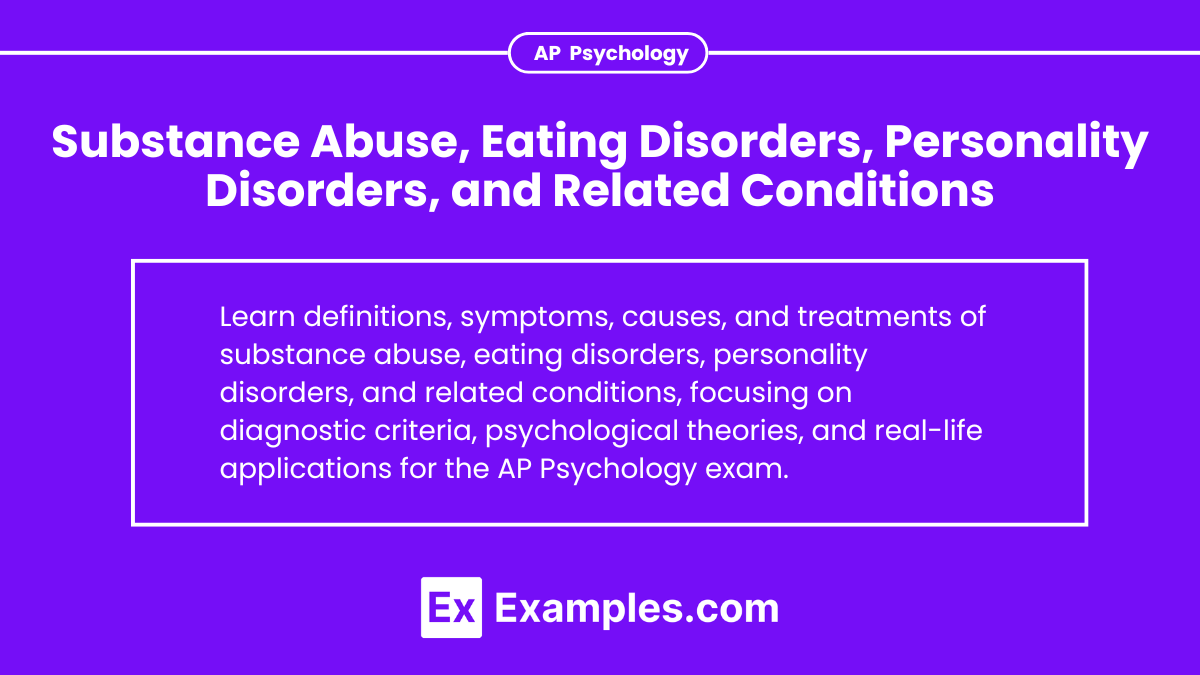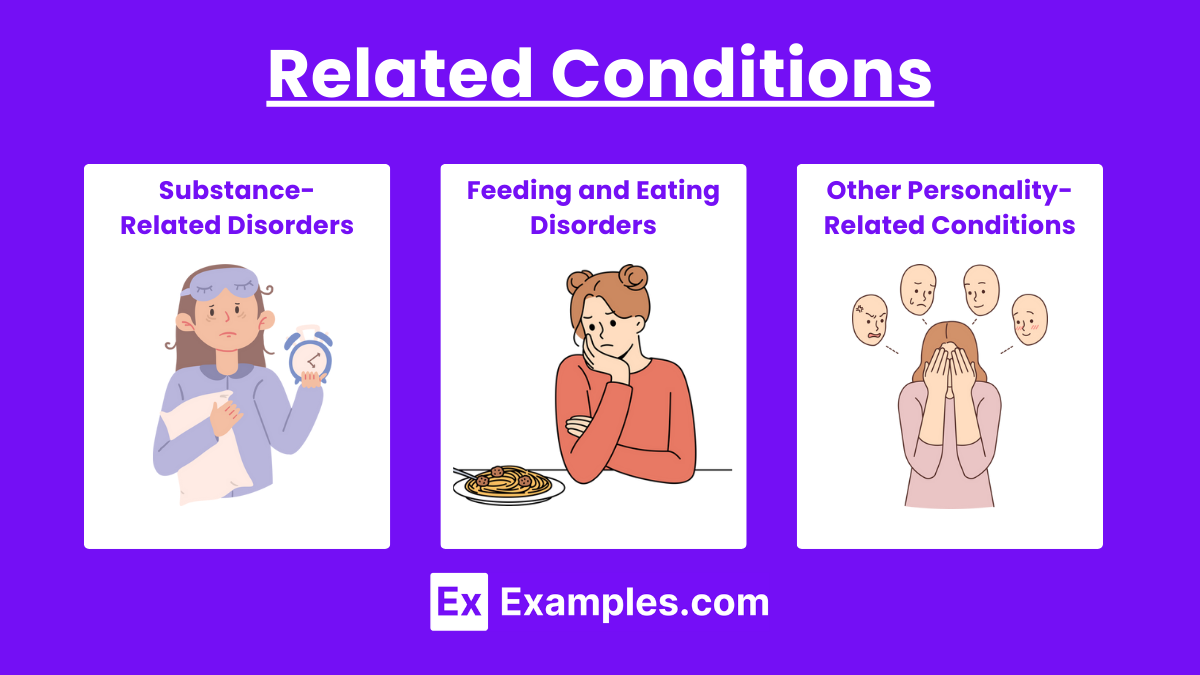Understanding substance abuse, eating disorders, personality disorders, and related conditions is crucial for the AP Psychology exam. These disorders impact individuals' physical and mental health, causing significant distress and impairment. Substance abuse involves harmful use of psychoactive substances, while eating disorders include severe disturbances in eating behaviors. Personality disorders feature enduring maladaptive patterns in cognition and behavior. Recognizing symptoms, causes, and treatments of these conditions is essential for mastering the psychological concepts and achieving high scores in AP Psychology.
Learning Objectives
Learn the definitions, symptoms, causes, and treatments of substance abuse, eating disorders, personality disorders, and related conditions. Focus on identifying key concepts such as dependence, tolerance, and withdrawal for substance abuse; recognize different eating disorders and their health risks; comprehend the clusters and characteristics of personality disorders; and be aware of related conditions. Grasp the biological, psychological, and sociocultural factors influencing these disorders and the various therapeutic approaches used in treatment.
Substance Abuse
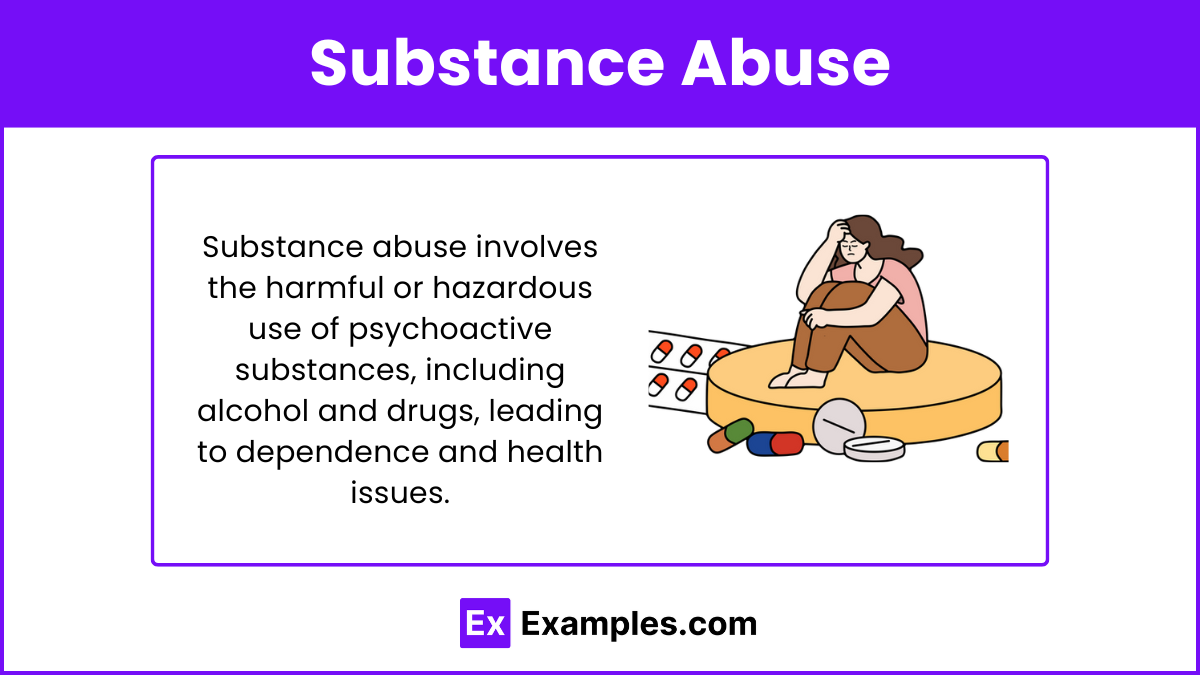
Substance abuse refers to the harmful or hazardous use of psychoactive substances, including alcohol and illicit drugs.
Key Concepts
Dependence: A state in which a person relies on a substance physically or psychologically.
Tolerance: The need to take larger doses of a substance to achieve the same effect.
Withdrawal: Symptoms that occur when a dependent person stops taking a substance.
Commonly Abused Substances
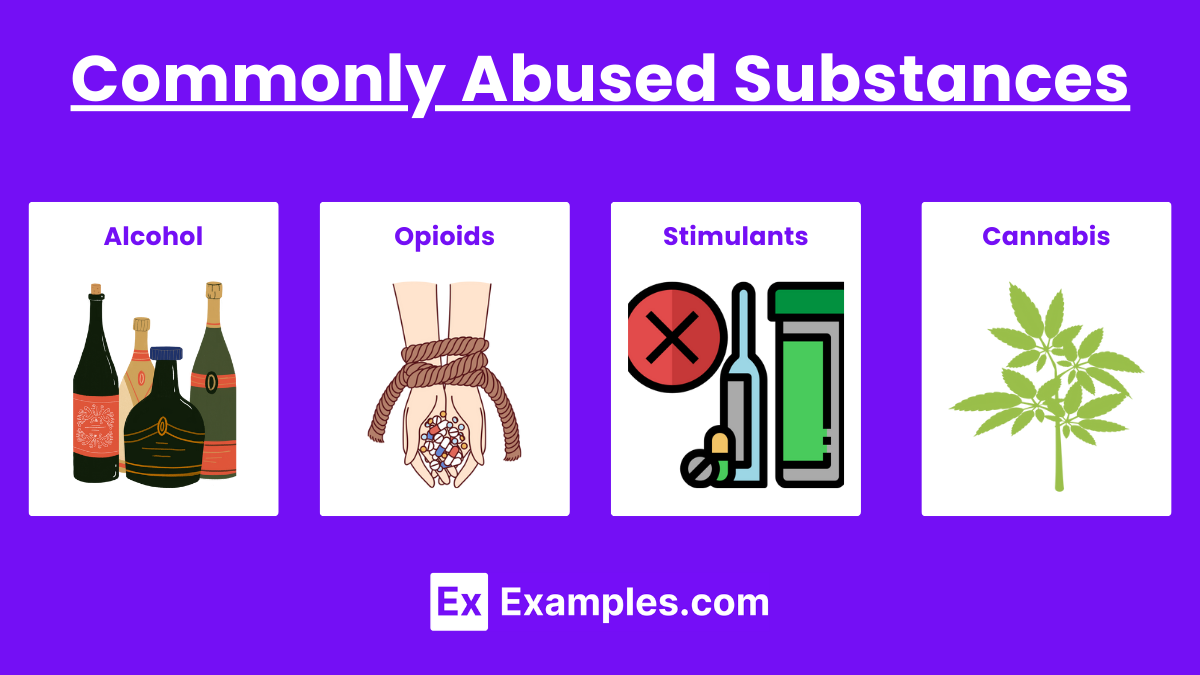
Alcohol: Causes relaxation, but can lead to dependence, liver disease, and cognitive impairments, distinct from the effects of communicable diseases.
Opioids: Pain relief, but highly addictive with a high overdose potential.
Stimulants (e.g., cocaine, methamphetamine): Increase energy and alertness, but can cause cardiovascular problems and paranoia.
Cannabis: Can cause euphoria and relaxation, but long-term use can impair memory and learning objectives.
Theories of Substance Abuse
Biological: Genetic predisposition and brain chemistry (dopamine system).
Psychological: Stress, trauma, and coping mechanisms.
Sociocultural: Peer pressure, cultural norms, and socioeconomic status.
Treatment
Behavioral Therapy: Cognitive-behavioral therapy (CBT), contingency management.
Medications: Methadone, buprenorphine for opioid addiction; naltrexone, acamprosate for alcohol dependence.
Support Groups: Alcoholics Anonymous (AA), Narcotics Anonymous (NA).
Eating Disorders
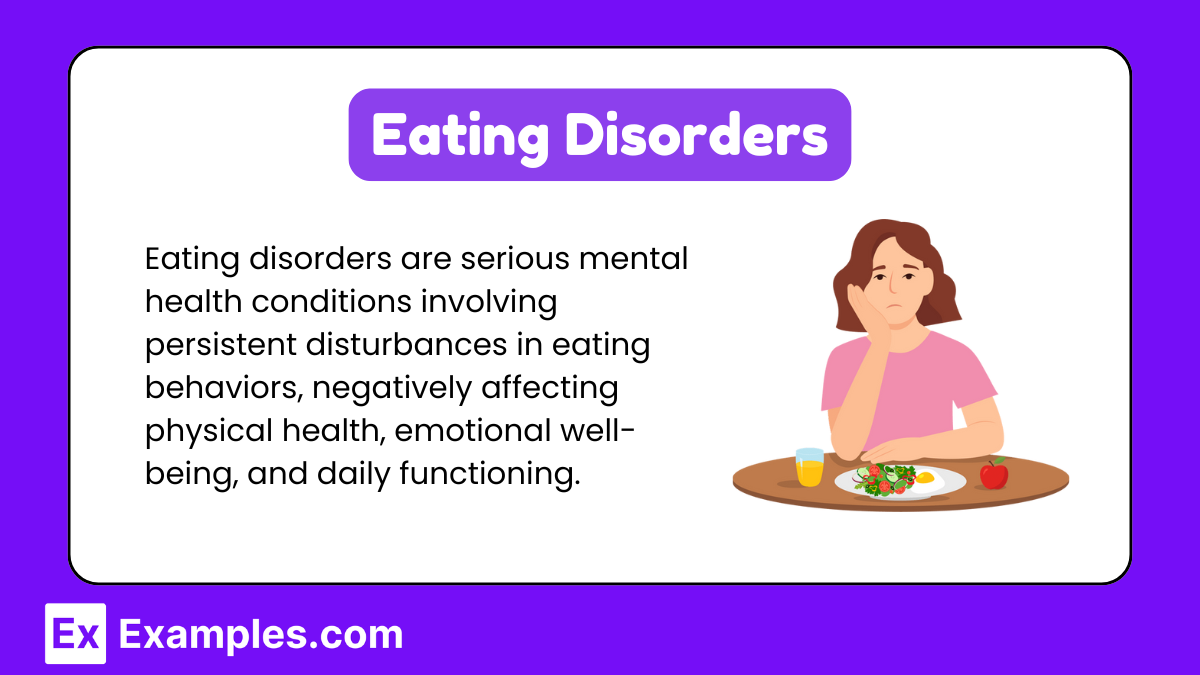
Eating disorders are serious conditions related to persistent eating behaviors that negatively impact health, emotions, and the ability to function in important areas of life.
Types of Eating Disorders
Anorexia Nervosa: Characterized by an intense fear of gaining weight and a distorted body image leading to restricted food intake.
Symptoms: Extreme weight loss, malnutrition, denial of hunger, excessive exercise.
Health Risks: Heart issues, bone density loss, infertility.
Bulimia Nervosa: Involves episodes of binge eating followed by purging (vomiting, laxatives) to prevent weight gain.
Symptoms: Swollen glands, tooth decay, gastrointestinal problems.
Health Risks: Electrolyte imbalance, heart issues, digestive problems.
Binge-Eating Disorder: Recurrent episodes of eating large quantities of food without purging.
Symptoms: Eating rapidly, eating until uncomfortably full, eating alone.
Health Risks: Obesity, type 2 diabetes, cardiovascular diseases.
Causes
Genetic: Family history of eating disorders.
Psychological: Low self-esteem, perfectionism, anxiety, and depression are crucial aspects of self-concept.
Sociocultural: Societal pressures, media influence, cultural beauty standards.
Treatment
Therapy: Cognitive-behavioral therapy (CBT), family-based therapy (FBT).
Nutritional Counseling: Guidance on healthy eating habits.
Medications: Antidepressants for associated depression and anxiety.
Personality Disorders
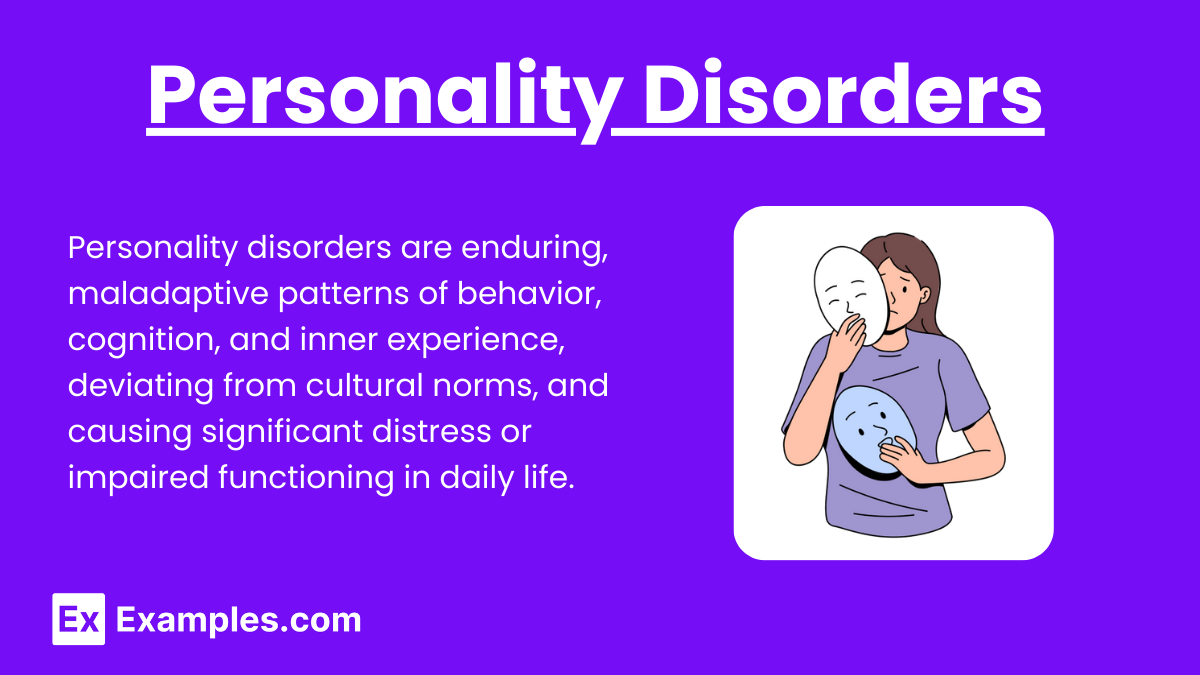
Personality disorders are enduring patterns of behavior, cognition, and inner experience that deviate markedly from the expectations of an individual's culture.
Types of Personality Disorders
Cluster A (Odd, Eccentric)
Paranoid Personality Disorder: Distrust and suspicion of others.
Schizoid Personality Disorder: Detachment from social relationships.
Schizotypal Personality Disorder: Acute discomfort in close relationships, cognitive or perceptual distortions.
Cluster B (Dramatic, Emotional, Erratic)
Antisocial Personality Disorder: Disregard for and violation of the rights of others.
Borderline Personality Disorder: Instability in relationships, self-image, and affects, with marked impulsivity.
Histrionic Personality Disorder: Excessive emotionality and attention-seeking.
Narcissistic Personality Disorder: Grandiosity, need for admiration, lack of empathy.
Cluster C (Anxious, Fearful)
Avoidant Personality Disorder: Social inhibition, feelings of inadequacy, and hypersensitivity to negative evaluation are critical points in the evaluation report.
Dependent Personality Disorder: Excessive need to be taken care of, leading to submissive and clinging behavior.
Obsessive-Compulsive Personality Disorder: Preoccupation with orderliness, perfectionism, and control.
Causes
Biological: Genetic predisposition, brain structure, and function abnormalities.
Environmental: Childhood trauma, abuse, and neglect.
Psychosocial: Dysfunctional family dynamics, social relationships.
Treatment
Psychotherapy: Dialectical behavior therapy (DBT), cognitive-behavioral therapy (CBT), psychodynamic therapy.
Medications: Mood stabilizers, antipsychotics, antidepressants for comorbid conditions.
Related Conditions
Substance-Related Disorders
Substance Use Disorders: Patterns of symptoms resulting from the use of a substance which the individual continues to take, despite experiencing problems as a result.
Substance-Induced Disorders: Include intoxication, withdrawal, and other substance/medication-induced mental disorders.
Feeding and Eating Disorders
Pica: Eating non-food substances.
Rumination Disorder: Repeated regurgitation of food.
Avoidant/Restrictive Food Intake Disorder (ARFID): Eating or feeding disturbance leading to significant weight loss or nutritional deficiency.
Other Personality-Related Conditions
Trauma- and Stressor-Related Disorders: Including PTSD, acute stress disorder, and adjustment disorders.
Dissociative Disorders: Disruptions in memory, identity, or consciousness, such as Dissociative Identity Disorder (DID).
Treatment Approaches
Integrated Treatment Plans: Combining medication, therapy, and lifestyle changes.
Multidisciplinary Teams: Involving psychologists, psychiatrists, nutritionists, and social workers.
Prevention and Education
Awareness Programs: Reducing stigma and educating about early signs and symptoms.
Support Systems: Encouraging strong support networks and healthy coping strategies.

